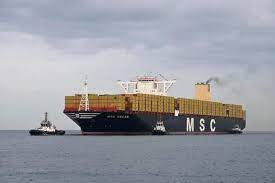
In a seismic upheaval resonating throughout the intricate tapestry of global maritime affairs, titans of the shipping realm, namely Maersk and CMA CGM, have embarked on an unprecedented course by halting trade through the Red Sea Strait. This bold maneuver follows a barrage of Houthi attacks, thrusting the maritime security paradigm into a realm of heightened complexity and urgency.
Red Sea Strait: A Strategic Chokepoint
The Red Sea Strait, an indispensable conduit knitting together the Mediterranean Sea and the Indian Ocean, has long served as a strategic chokepoint for the world’s commerce. Its significance, not confined solely to its role as a primary shipping thoroughfare, extends to the geopolitical theater. Recent Houthi aggressions have cast shadows on the safety and stability of vessels traversing this pivotal waterway, amplifying its strategic importance.
Houthi Attacks
The escalating series of Houthi assaults on commercial vessels navigating the Red Sea Strait has triggered alarms within the maritime echelon. The indiscriminate targeting of shipping assets has compelled major maritime entities to reassess the viability of transiting through this region. The nexus of Houthi attacks and the strategic prominence of the Red Sea Strait have birthed a perfect storm of challenges for the global shipping domain.
Maritime Security
The suspension of trade routes by Maersk and CMA CGM thrust maritime security into the forefront of international consciousness. The backbone of global trade, the shipping industry, now grapples with the formidable task of safeguarding its vessels and crews within a peril-laden milieu. Imperative to the preservation of maritime commerce is the urgent implementation of enhanced security measures, both autonomously by shipping entities and collaboratively with naval forces.
Geopolitical Implications: A Confluence of Conflicts
The decision of Maersk and CMA CGM to suspend trade through the Red Sea Strait is not a mere response to localized incidents; rather, it serves as a manifestation of the intricate geopolitical convolutions enveloping the region. The internal tumult in Yemen, with Houthi rebels at its epicenter, has drawn regional and international powers into a maelstrom. The Red Sea Strait, metamorphosed into a geopolitical flashpoint, now contends with the intricate dynamics of these conflicts, deepening the complexity of an already convoluted milieu.
Shipping Industry in Turmoil: Maersk and CMA CGM Take a Stand
In a resolute stance, Maersk, the Danish shipping juggernaut, declared the suspension of its vessels’ passage through the Red Sea Strait, citing the burgeoning threat posed by Houthi attacks. Swiftly echoing this stand, CMA CGM, a formidable French container shipping conglomerate, underscored the gravity of the security situation in the region. This collective pronouncement by two industry behemoths resounds as a clarion call, signaling the gravity of the situation and the imperative for decisive action.
Global Trade Disrupted

The suspension of trade routes via the Red Sea Strait casts immediate and far-reaching ramifications upon global trade. As a pivotal conduit for goods shuttling between Europe, Asia, and Africa, any disruption in the Red Sea Strait sends reverberations across global industries. The financial implications of rerouting shipments, potential delays in delivery times, and the overarching impact on supply chains emerge as factors closely monitored by industries and consumers alike in the weeks to come.
Collateral Damage
Maersk and CMA CGM’s decision to suspend Red Sea trade routes finds resonance among other shipping stalwarts. Hapag-Lloyd, another prominent player in the maritime domain, declared its decision to halt vessel passages through the Red Sea Strait, aligning with the collective response to heightened security risks. Additionally, the Mediterranean Shipping Company, a global shipping leviathan, has joined the suspension, underscoring the industry-wide acknowledgment of the severe challenges posed by Houthi attacks.
The Red Sea Strait as a Geopolitical Flashpoint
The historical annals of the Red Sea Strait reveal a contentious waterway, marred by piracy and geopolitical tensions. The current predicament, however, injects a new layer of complexity with the involvement of Houthi rebels. Delving into historical context becomes imperative to gauge the long-term impact of the current suspension on global trade dynamics.
Security Measures
In response to the Houthi assaults, shipping companies are engaged in a meticulous reassessment of their security protocols. The collaboration between private shipping firms and international naval forces, exemplified by the involvement of the UK and US navies in patrolling the Red Sea Strait, assumes heightened significance. The question of whether additional security measures, including the deployment of naval escorts for commercial vessels, will be instituted looms large, subject to close scrutiny in the wake of recent developments.
Looking Ahead: Future Outlook and Industry Resilience
As the shipping industry grapples with the suspension of Red Sea trade routes, a compelling need arises to scrutinize the long-term outlook and resilience of the sector. Industry savants are poised to explore alternative routes and contingency plans to mitigate the impact of disruptions. Concurrently, diplomatic endeavors aimed at addressing the root causes of the conflict in the region stand as linchpins in providing a stable environment for maritime activities. The adaptability of the shipping industry to evolving geopolitical challenges will, undeniably, shape its future trajectory.

In summation, the suspension of trade via the Red Sea Strait by Maersk and CMA CGM, alongside other eminent shipping entities, ushers in a watershed moment in the maritime industry. As the global gaze remains fixed on unfolding events in the region, the narrative pivots toward diplomatic resolutions, augmented security measures, and the resilience of the shipping industry in navigating the labyrinthine geopolitical landscape. The repercussions of these events transcend immediate disruptions to global trade, serving as a poignant reminder of the interconnected nature of the world’s maritime pursuits and the imperative for collaborative endeavors to ensure their security and continuity.











Comments 1